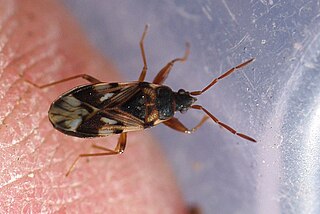
The western mosquitofish is a North American freshwater fish, also known commonly, if ambiguously, as simply mosquitofish or by its generic name, Gambusia, or by the common name gambezi. Its sister species, the eastern mosquitofish is also referred to by these names.

The little swift, is a small species of swift found in Africa and southwestern Asia, and are vagrants and local breeders in southern Europe. They are found both in urban areas and at rocky cliffs where they build nests in a way typical of all members of the order Apodiformes. The genus name Apus is Latin for a swift, thought by the ancients to be a type of swallow without feet. The Latin specific affinis means similar to or related to, but in this case the species that the little swift supposedly resembles is not clear from the description. A population formerly considered to be an eastern subspecies of little swift is now separated as a distinct species, the house swift.

Jerdon's bush lark or Jerdon's lark is a species of lark in the family Alaudidae found in south Asia. This was formerly considered as a subspecies of Mirafra assamica and termed as the Madras bushlark. Two other species in the complex include Mirafra marionae and Mirafra microptera. Jerdon's bush lark is typically very pale on the underside

Tickell's leaf warbler is a leaf warbler found in Asia in the countries of Bangladesh, Bhutan, China, India, Myanmar, Nepal, Pakistan and Thailand. The species has a yellowish underside and supercilium. Like other leaf warblers it feeds mostly on insects by gleaning and short sallies. An active bird, it prefers the canopy and low shrubbery and can be difficult to track as it moves actively from branch to branch, acrobatically exploring the underside of leaves and twigs. The clear yellowish undersides and lack of a wing bar can be used to tell it apart from similar species. It has slim dark legs with largely pale lower mandible and grayish wing panel.
The golden otocinclus is one of the smallest known suckermouth catfish, often called a 'dwarf oto'. Endemic to Southeast Brazil, this herbivorous, rheophilic, bottom-feeder only grows to around 4 cm (1.6 in) in length. The close relatives of this small fish are often used for the purpose of controlling algae in small home aquariums, under the name Otocinclus affinis. In reality, they belong to the species O. vittatus, O. vestitus and O. macrospilus and O. huaorani. The real M. affinis is not present in the aquarium hobby.

The chocolate pipistrelle is a species of vesper bat in the family Vespertilionidae. It is found in China, India, Myanmar, Nepal, and Sri Lanka.

Blyth’s frogmouth is a species of bird in the family Podargidae. It was previously considered to be conspecific with the Javan frogmouth and Palawan frogmouth. The bird is a tropical species that ranges from India to Australia.

The black-chested jay is a species of bird in the family Corvidae.

The long-tailed mole is a species of mole in the family Talpidae. It is found in China, Vietnam and Myanmar.

The intermediate horseshoe bat is a bat species of the family Rhinolophidae that is very widespread throughout much of the Indian subcontinent, southern and central China and Southeast Asia. It is listed by IUCN as Least Concern as it is considered common where it occurs, without any known major threats.
Falsistrellus is a genus of vespertilionid family of bats, small predatory flying mammals. They are known from Australia. The poorly researched species have been variously placed by authors, and revised again by studies of their distinct characteristics, consequently the falsistrelles may also be referred to as pipistrelles or false pipstrelles.

The southern river terrapin is a turtle of the family Geoemydidae found in Malaysia, Indonesia and Cambodia.

"Crocodylus" affinis is an extinct species of crocodyloid from the Eocene of Wyoming. Fossils were first described from the Bridger Formation by American paleontologist Othniel Charles Marsh in 1871. Marsh described the species, along with every other species of crocodyloid in the Bridger Formation, under the genus Crocodylus. The known specimen of "Crocodylus" affinis is a skull found at Grizzly Buttes, Wyoming, measuring 13 inches in length on the upper surface. Recent phylogenetic studies of crocodyloids show that "C." affinis is not a species of Crocodylus, but a genus has not yet been erected to include the species. Other Bridger species such as Crocodylus clavis and Brachyuranochampsa zangerli have been synonymized with "C." affinis.

Blyth's paradise flycatcher, also called the oriental paradise flycatcher, is a species of bird in the family Monarchidae. It is native from southern China to Sumatra and Melanesia. Formerly, it was considered a subspecies of the Asian paradise flycatcher until elevated to species rank by the IOC in 2015.

Scolopostethus is a genus of dirt-colored seed bugs in the family Rhyparochromidae. There are more than 30 described species in Scolopostethus.
Scolopostethus pacificus is a species of dirt-colored seed bug in the family Rhyparochromidae. It is found in North America.
Scolopostethus atlanticus is a species of dirt-colored seed bug in the family Rhyparochromidae. It is found in North America.

Scolopostethus thomsoni is a species of dirt-colored seed bug in the family Rhyparochromidae. It is found in Africa, Europe and Northern Asia, and North America.

Scolopostethus pictus is a species of dirt-colored seed bug in the family Rhyparochromidae, found in Europe and western Asia.















